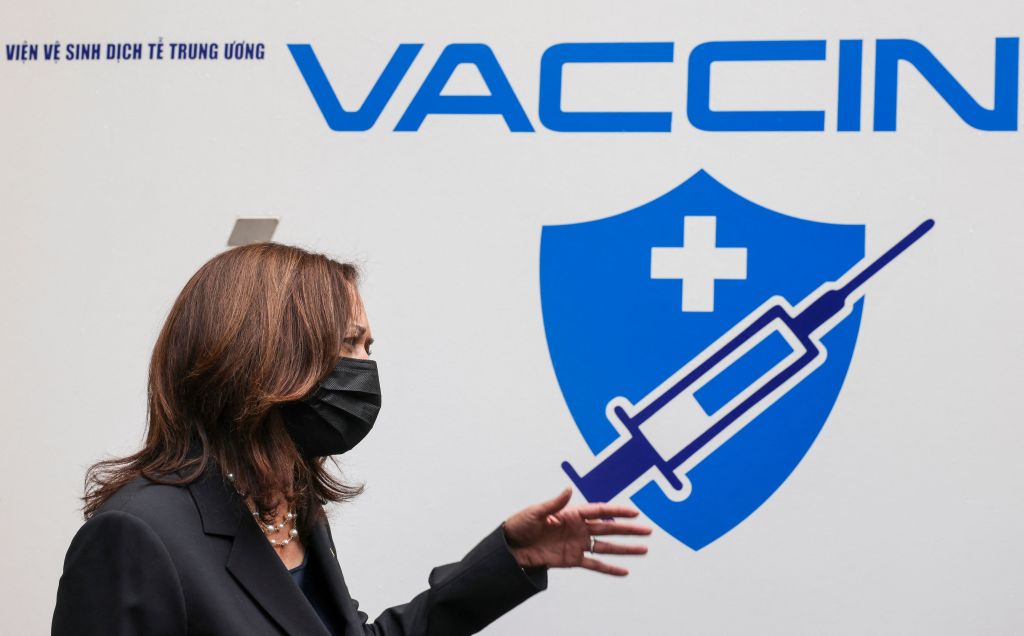The U.S. will reportedly approve booster shots for all 3 COVID-19 vaccines at 6 months, not 8


A free daily email with the biggest news stories of the day – and the best features from TheWeek.com
You are now subscribed
Your newsletter sign-up was successful
U.S. officials said last week that adults vaccinated with the Pfizer and Moderna COVID-19 vaccines should start getting booster shots eight months after their second dose was administered, starting in mid-September. Now, a person familiar with the plans tells The Wall Street Journal, federal regulators will likely approve boosters for all three approved vaccines — Pfizer, Moderna, and Johnson & Johnson — starting six months after inoculation.
Data the Food and Drug Administration is reviewing from vaccine makers and other countries is based on boosters given at six months, the Journal reports. "The Biden administration and companies have said that there should be enough supply for boosters that they plan to begin distributing more widely on Sept. 20. The U.S. has purchased a combined 1 billion doses from Pfizer and Moderna."
The booster rollout for adults who aren't immunocompromised hinges on FDA approval and a recommendation from a key Centers for Disease Control and Prevention outside vaccine advisory committee. Preliminary studies show significant boosts to immune protections, but "that doesn't mean every patient needs to get a booster at six months," says Leana Wen, health policy professor at George Washington University.
The Week
Escape your echo chamber. Get the facts behind the news, plus analysis from multiple perspectives.

Sign up for The Week's Free Newsletters
From our morning news briefing to a weekly Good News Newsletter, get the best of The Week delivered directly to your inbox.
From our morning news briefing to a weekly Good News Newsletter, get the best of The Week delivered directly to your inbox.
There is some evidence that the vaccines lose some potency after several months and the Delta variant of the coronavirus has infected more vaccinated people than previous strains, although most breakthrough infections are mild.
The discussions about booster shots comes as the U.S. has more than 100,000 COVID-19 patients hospitalized, a level last seen on Jan. 30, before the vaccines were widely available, The Washington Post reports. Nearly a third of those hospitalizations are in Florida (17,000) and Texas (14,000), states with lower-than-average vaccination rates, large populations, and governors opposed to vaccine and mask requirements. The number of new daily cases is also almost back up to January levels — an average of 148,000 cases on Wednesday versus 151,000 on Jan. 30 — but COVID-19 deaths, 1,1000 a day, are much lower than the daily average of 3,100 recorded at the January peak.
A free daily email with the biggest news stories of the day – and the best features from TheWeek.com
Peter has worked as a news and culture writer and editor at The Week since the site's launch in 2008. He covers politics, world affairs, religion and cultural currents. His journalism career began as a copy editor at a financial newswire and has included editorial positions at The New York Times Magazine, Facts on File, and Oregon State University.
-
 How Democrats are turning DOJ lemons into partisan lemonade
How Democrats are turning DOJ lemons into partisan lemonadeTODAY’S BIG QUESTION As the Trump administration continues to try — and fail — at indicting its political enemies, Democratic lawmakers have begun seizing the moment for themselves
-
 ICE’s new targets post-Minnesota retreat
ICE’s new targets post-Minnesota retreatIn the Spotlight Several cities are reportedly on ICE’s list for immigration crackdowns
-
 ‘Those rights don’t exist to protect criminals’
‘Those rights don’t exist to protect criminals’Instant Opinion Opinion, comment and editorials of the day
-
 Trump HHS slashes advised child vaccinations
Trump HHS slashes advised child vaccinationsSpeed Read In a widely condemned move, the CDC will now recommend that children get vaccinated against 11 communicable diseases, not 17
-
 A fentanyl vaccine may be on the horizon
A fentanyl vaccine may be on the horizonUnder the radar Taking a serious jab at the opioid epidemic
-
 Health: Will Kennedy dismantle U.S. immunization policy?
Health: Will Kennedy dismantle U.S. immunization policy?Feature ‘America’s vaccine playbook is being rewritten by people who don’t believe in them’
-
 How dangerous is the ‘K’ strain super-flu?
How dangerous is the ‘K’ strain super-flu?The Explainer Surge in cases of new variant H3N2 flu in UK and around the world
-
 Vaccine critic quietly named CDC’s No. 2 official
Vaccine critic quietly named CDC’s No. 2 officialSpeed Read Dr. Ralph Abraham joins another prominent vaccine critic, HHS Secretary Robert F. Kennedy Jr.
-
 This flu season could be worse than usual
This flu season could be worse than usualIn the spotlight A new subvariant is infecting several countries
-
 FDA OKs generic abortion pill, riling the right
FDA OKs generic abortion pill, riling the rightSpeed Read The drug in question is a generic version of mifepristone, used to carry out two-thirds of US abortions
-
 Why are autism rates increasing?
Why are autism rates increasing?The Explainer Medical experts condemn Trump administration’s claim that paracetamol during pregnancy is linked to rising rates of neurodevelopmental disorder in US and UK
